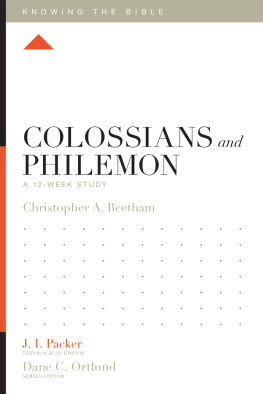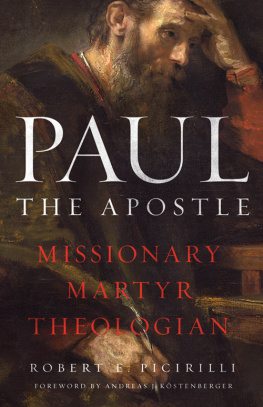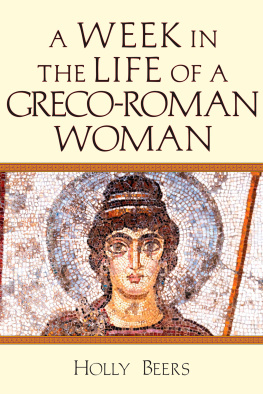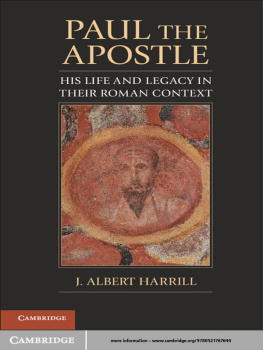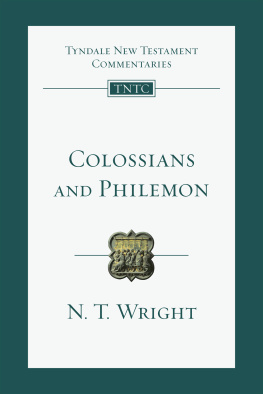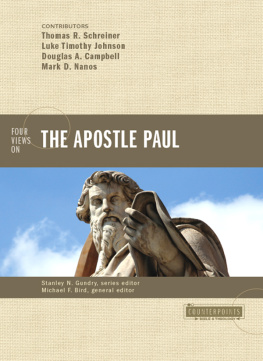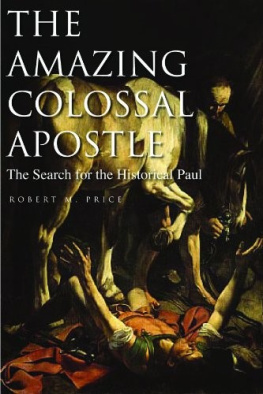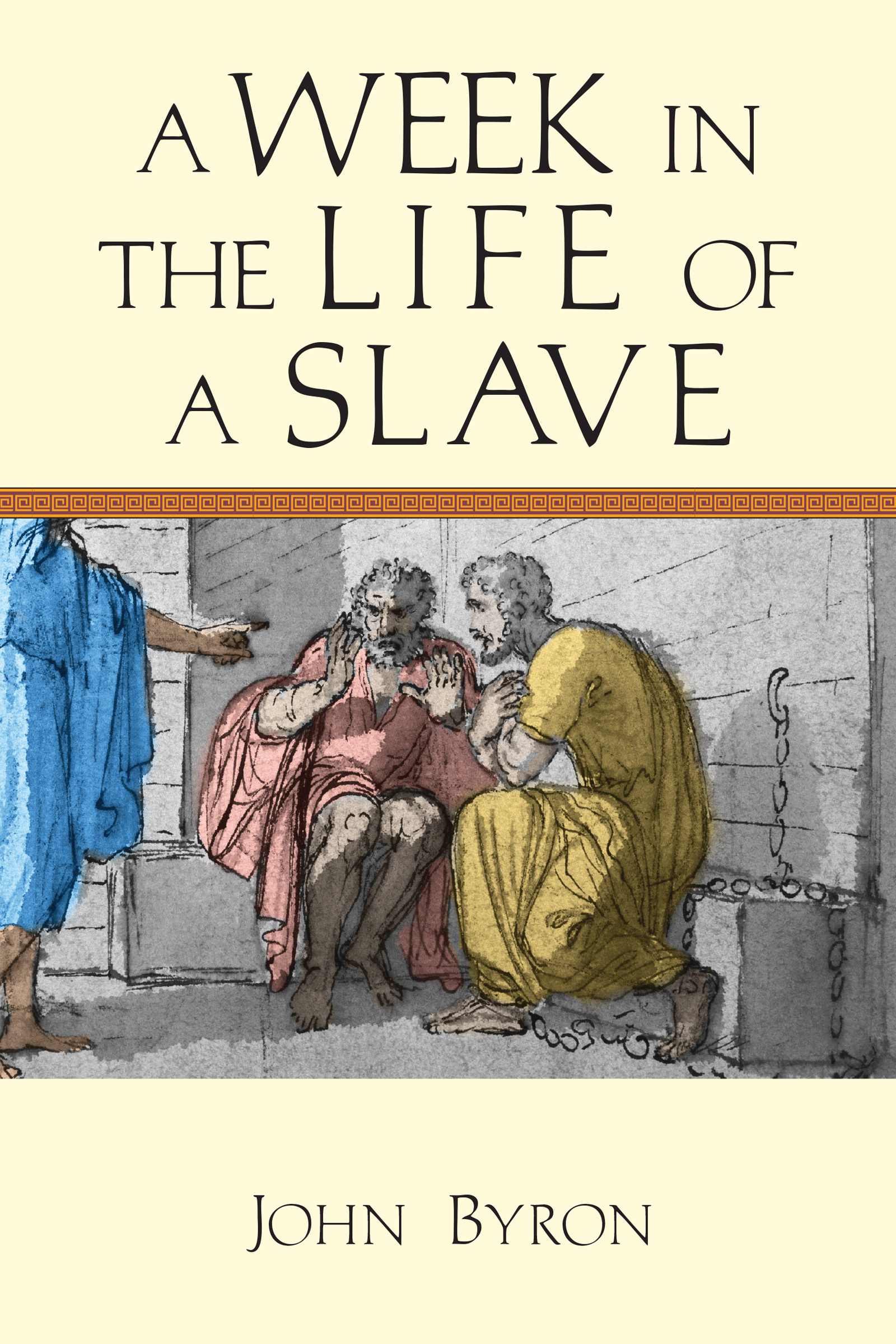F OR MY STUDENTS,
from whom I have experienced much
joy and satisfaction.
Contents
Acknowledgments
I WOULD LIKE TO THANK THE FOLLOWING PEOPLE, who read over earlier versions of the manuscript and made helpful, critical, and encouraging comments:
Lori Byron, my wife and self-described biggest fan, who has believed in me more than anyone else.
David A. deSilva, my colleague at Ashland Theological Seminary, who has supported me over many years and brought to my attention the Week in the Life series.
Julie Murdock, my former student and faithful teaching assistant.
Daniel G. Reid, editorial director, IVP Academic (retired), who began this project with me and provided valuable guidance.
Characters
Apphia The wife of Philemon. She is called sister by Paul in the opening of the letter to Philemon (Philem 2), which has led many to the conclusion that she is married to Philemon and mistress of their home.
Archippus A Christian leader in the Lycus Valley. Paul calls him fellow soldier in Philemon 2 and exhorts him to fulfill his ministry in Colossians 4:17. The mention of Laodicea just prior to Pauls exhortation in Colossians 4:17 could mean Archippus served the church there rather than Colossae. Later tradition held that he was the first bishop of Laodicea (Apostolic Constitutions 7.46).
Calmus A slave owned by Philemon who serves as the dye-works overseer in Colossae.
Demas A host of the church in Ephesus. Paul calls Demas his coworker in Philemon 24, and in Colossians 4:14 Demas sends greetings, suggesting he was well known by the church at Colossae. Second Timothy 4:10, however, indicates that Demas had fallen in love with the world, deserted Paul, and gone to Thessalonica. This tradition is more developed in the apocryphal Acts of Paul (Acts of Paul 3.1, 4, 12-14, 16).
Epaphras A leader of the church in the Lycus Valley and a companion of Paul. According to Colossians 1:7, the gospel message was brought to the Lycus valley by Epaphras. Although no mention of Epaphrass imprisonment is made in Colossians, Paul calls Epaphras his fellow prisoner in Philemon 23. Paul notes in Colossians 4:12 that Epaphras is always praying for the church in Colossae.
Eutyches A local believer and public slave serving as a guard in the Ephesus prison under the management of Tiro.
Magnus A slave who serves as Nymphas household manager in Laodicea. Magnuss name is taken from a fourth-century AD papyrus letter from Oxyrhynchus (Oxyrhynchus Papyri 12.1423) in which an Egyptian official describes the circumstances surrounding the flight of his slave, who stole some unspecified items and is residing in another city.
Nympha A woman in Laodicea who owns a medical-compound business and hosts the church in her home. In Colossians 4:15 Paul greets Nympha and the church in her house, suggesting she was the owner of the house. She was probably a widow who attained a level of independence and freedom from male oversight of her business affairs.
Onesimus A fugitive slave owned by Philemon (Philem 16). The name, commonly used for slaves, means useful, about which Paul makes a pun when he describes the value of Onesimus to himself and Philemon (Philem 11). He was converted by Paul and became close to him while the apostle was in prison (Philem 10). In Colossians 4:9, Paul says Onesimus is a faithful and dear brother, who is one of you, suggesting he was from Colossae.
Paul Apostle to the Gentiles and author of thirteen letters in the New Testament, including the letter to Philemon. He is imprisoned awaiting trial.
Philemon A business owner, host of the local church in Colossae, and owner of Onesimus. A convert of the apostle Paul (Philem 19), he had a reputation as one who refreshed the hearts of the saints (Philem 7). Paul calls him fellow worker (Philem 1), suggesting he played a role in the ministry of the gospel, perhaps partnering with Paul in evangelistic work (Philem 17).
Tiro Manager of the prison in Ephesus and a local Christian who was once a public slave before gaining freedom and climbing the social ladder. Tiro is named after a slave once owned by the Stoic philosopher Cicero.
Tychicus A companion of Paul who calls him a dear brother, a faithful minister and fellow servant in the Lord in Colossians 4:7. According to Colossians, Tychicus is carrying a letter to Colossae and passing on news to the church. Paul also mentions Onesimus in Colossians 4:9, which suggests Tychicus might have accompanied the errant slave to his home in Colossae.
1
Ephesus
The Interview

T HE KNOCK ON THE DOOR ECHOED IN THE CRAMPED ROOM.
It was not a luxurious room, but it was more comfortable than most of the rooms in which residents lived. It was sparsely furnished with a bed, a small table, and a few stools at which its occupant could take meals, visit with a guest, read, and write. The floor was made of stone, worn smooth by the pacing of previous occupants. The current tenant was no different and indeed may have worn down the stones even more than the others had.
A benefit of this particular room was that it had an exterior wall and thus a window. Most residents were not so fortunate and typically were housed deeper inside the compound. But the window was too high to allow a view of the courtyard, even with the assistance of a stool. It offered fresh air and sunshine, but never the sounds of birdsthe constant din in the courtyard either masked the sound of the birds or simply kept them away.
The current resident was in many ways not unlike previous occupants. He was accused of breaching the local law and awaited a trial. It was his Roman citizenship in part that provided him with the luxuries of this room. But the incessant din from the cobblestone courtyard and the occasional cries of prisoners being punished that came through the window were a constant reminder that he was not here by choice, nor was he guaranteed an escape from punishment should he be found guilty. Many of the previous occupants had themselves paced the floor, written a last letter at the table, and met with family for a final time all within earshot of the sounds in the courtyard.
The knock sounded on the door a second time. Preoccupied with the sheets of papyrus in front of him, the man hadnt heard the first knock. Now the sound aroused his attention, and he raised his head.
Yes, yes, come in please, the man responded to a third, more insistent knock. He moved from his stool to the door, revealing another advantage he enjoyed: no chains restricted his movement or shackled him to the wall.
The heavy wooden door swung open and revealed the figure of a prison guard. You have visitors, he announced. His face was partially hidden in the shadowy passageway.
Thank you, the man said. Who is it this time?
Demas and a stranger.
Well, show them in.
The guard stepped aside, and a pair of figures emerged from the passageway and entered the dimly lit room. The first to enter, Demas, the man knew. He was from Thessalonica, where he was a merchant, but more recently he had been a traveling companion. He sometimes served as a messenger to the churches in the surrounding area.
Standing behind Demas was a young man, not as well dressed. It was clear he was not entirely comfortable in the prison, and he kept one eye cautiously on the guard as he stood waiting for Demas to introduce him.



